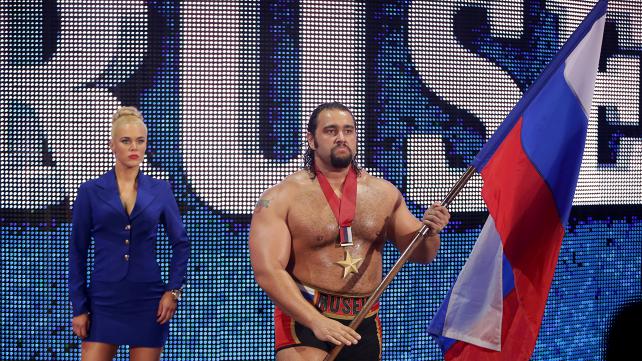It was tasteless, but no surprise for a wrestling fan that the WWE referenced the MH17 crash
Wrestling is all about larger-than-life characters, and drawing on actual events to create interesting television

It came as no surprise to any WWE fan that during last night's Battleground PPV, the “ravishing Russian” Lana made a veiled reference to the MH17 disaster.
Since Lana's first appearance – alongside the Bulgarian Rusev – WWE have been using old Cold War tropes in an attempt to establish the pair as “bad”. There's flag-waving, there's titantron pictures of Vladimir Putin – and it's all designed to elicit boos for the Russians and chants of “USA! USA!” for the American performers they're feuding with.
Interestingly, those American performers first started working together in a storyline designed as a bit of a dig at the Republican Tea Party. Zeb Colter, a magnificently moustachioed Vietnam veteran, objected to the dazzlingly handsome Alberto del Rio as a Mexican immigrant. He and his charges, including Jack Swagger, with whom he paired up last night, argued for the closure of borders, the need to work hard, and to speak English properly, and dubbed themselves The Real Americans.
But when conservative political pundit Glenn Beck expressed outrage at them, accusing them of mocking a sub-section of the American population, Colter broke the fourth wall, recording a vignette still available on Youtube. He explained that wrestling is all about larger-than-life characters, about being provocative, and drawing on actual events to create interesting television.
Perhaps most significantly, he also declared that wrestling audiences are smart enough to assess the characters they're being presented with, and will make a judgement on them accordingly.
To hint at “recent events” and Russian culpability for them, as Lana did last night, may have been hideously tasteless, but it wasn't a shock. Lana is supposed to be a “bad” person. What better way to make her a clear and obvious villain than to have her mention such a disaster? And Lana did indeed get the kind of negative reaction - or “heat” - the powers-that-be wanted in front of a mostly American arena audience.
That's wrestling, though. Sometimes it can be subtle and emotive and brilliant. But more often than not it's pantomime drawing on stereotypes, and the “cheap pop” (or easy cheer) takes much less effort than great acting and writing.
That's not to say it's right – the broad brushstroke characterisation is infuriating and often offensive if you're inclined to listen out for it. And sometimes it's puzzling - with over a third of their audience estimated to be female, and about a half estimated to be outside America, it's often bewildering why they'll indulge so heavily in casual sexism and jingoism for a televised product; perhaps they still haven't quite got to grips with the globalisation of their material.
But this isn't new. It's been going on forever. And what is interesting is that Lana and Rusev were allowed to continue with their storyline and positively encouraged to go to the extreme of invoking MH17. Nine years ago, a wrestler working under the name of Muhammed Hassan, an apparently Muslim fundamentalist, ended up leaving WWE after a recorded show in which he featured was aired just after the London bombings.
I have a theory that WWE, in what they happily deem their “reality era”, are glad to get mainstream media headlines wherever they can. It would explain why they're focusing their efforts on Total Divas, a “reality show” in the style of Made in Chelsea which airs on E! and features their female talent. It would explain why fan favourite Daniel Bryan didn't appear in the main event of January's Royal Rumble - the internet outrage grabbed media coverage across the globe.
And I suspect they'll be secretly very happy indeed so many people are talking about Battleground, which wasn't much hyped beforehand, and from what I've seen has disappointed many fans with the predictability of the results.
It may be lowest common denominator tactics, but it gets attention. Basically, if you want nuanced thoughtful drama, don't watch WWE. If you want straightforward sledgehammer-like melodrama, there's nothing better.
Carrie Dunn is the author of Spandex, Screw Jobs and Cheap Pops : Inside the Business of British Pro Wrestling (Pitch, 2013)

Join our commenting forum
Join thought-provoking conversations, follow other Independent readers and see their replies